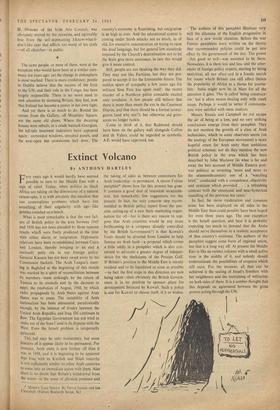Extinct Volcano
By ANTHONY HARTLEY
FIVE years ago it would hardly have seemed possible to turn to the Middle East with a sigh of relief. Today, when politics in black Africa are taking on the dimensions of a natural catastrophe, it is with precisely this emotion that one contemplates problems which have lost something of their angularity with age—like Pebbles rounded on a beach.
What is most remarkable is that the vast fail- ure of British policy in the area between 1945 and 1958 has not been attended by those ruinous results whicfi were freely predicted at the time with either alarm or resignation. Diplomatic relations have been re-established between Cairo and London, thereby bringing to an end a curiously petty era in our foreign policy. General Kassem has not been swept away by his Communist backers. The Arab League's meet- ing in Baghdad at the beginning of this month was marked by a spirit of reconciliation between Its members—most strikingly by the return of Tunisia to its councils and by the decision to apply the resolution of August, 1960, by which radio propaganda by Arab States against Arab States was to cease. The instability of Arab nationalism has been attenuated, paradoxically enough, by the balance of rivalry between the United Arab Republic and Iraq. Oil continues to flow. The Egyptian Government has not tried to make use of the Suez Canal in its disputes with the West. Even the Israeli problem is temporarily quiescent.
This lull may be only momentary, but some features of it appear likely to be permanent. For Instance, Arab unity is now further off than it was in 1958, and it is beginning to be apparent that Iraq with its Kurdish and Shiah majority is not sufficiently similar to other Arab countries to enter into an immediate union with them. Also there is no doubt that Britain's withdrawal from the scene—in the sense of physical presence and * hlioou Ensl ISSUES. By David Ennals and Ian Campbell. (Fabian Research Series, 3s.) the taking of sides as between contestants for Arab leadership—is permanent. A recent Fabian pamphlet* shows how far this process has gone. It contains a good deal of historical recapitula- tion, but remarkably few suggestions for the present. In fact, the only concrete step recom- mended to British policy (apart from the pos- sible setting-up of a new State marketing organ- isation for oil--but is there any reason to sup- pose that Arab countries would be any more forthcoming to a company directly controlled by the British Government?) is that Kuwait's funds should be diverted from London to help finance an Arab bank—a proposal which comes a little oddly in a pamphlet which is also con- cerned to advocate a greater degree of indepen- dence for the sheikdoms of the Persian Gulf. If Britain's position in the Middle East is merely residual and to be liquidated as soon as possible —in fact the first steps in this direction are now being taken—then obviously the British Govern- ment is in no position to sponsor plans for development financed by Kuwait. Such a policy is one for Kuwait to choose itself, if it so wishes. The authors of this pamphlet illustrate very well the dilemma of the English progressive in face of a new world situation. Before the war Fabian pamphlets were written on the theory that recommended policies could be put into effect by the government of the day. The power —for good or evil—was assumed to be there. Nowadays, it is there less and less, and the utter- ances of foreign policy experts, starting by being analytical, all too often end in a frantic search for issues which Britain can still affect (hence the popularity of Africa as a theme for journa- lists: India might now be in Mars for all the attention it gets). This is called 'being construct- ive,' but it often means dealing only with small issues. Perhaps it would be better if commenta- tors were satisfied with mere analysis.
Messrs. Ennals and Campbell do not escape the air of being at a loss, and no very striking conclusions emerge from their pamphlet. They do not mention the growth of a class of Arab technicians, which to some observers seems (on the analogy of the European movement) a more hopeful omen for Arab unity than ambitious political schemes; nor do they mention the new British policy in the area which has been described by John Marlowe (in what is far and away the best account of Middle Eastern post- war politics) as reverting 'more and more to the nineteenth-century one of a "watching brief," conducted with a competence, objectivity and cynicism which provided . . . a refreshing contrast with the emotional and near-hysterical muddling of the previous ten years.'
In fact, far more moderation and common sense has been displayed on all sides in the Middle East than could possibly have been hoped for even three years ago. The one exception is the Israeli question, and here it is probably expecting too much to demand that the Arabs should nerve themselves to a realistic acceptance of that country's existence. The authors of the pamphlet suggest some form of regional union, but that is a long way off. At present the Middle East is like an extinct volcano with a small active zone in the middle of it, and nobody should underestimate the possibilities of eruption which still exist. For the moment, all that can be achieved is the sealing of Israel's frontiers with her neighbours and the restraining of militarists on both sides of them. It is a sombre thought that this depends on agreement between the great powers acting through the UN.






































 Previous page
Previous page